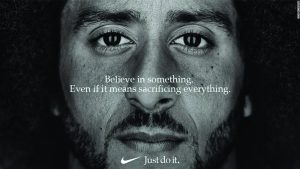
By Rachel Hawkins, NDG Writer
This month, it seems many Americans have been split, even more than usual, on political, and social issues. Whether it’s a Supreme Court nominee’s confirmation hearing or a business marketing move, these events have led Americans to turn their backs on important issues affecting everyone in some way.
When you look up the meaning of the phrase ‘turning your back,’ it means, to refuse to accept someone or something with which you previously you agreed.
Today we will take a look at these two polarizing events.
The almost handshake
The first example is about a handshake, or actually, a non-handshake. On Sept. 4, in the middle of a break of Judge Brett Kavanaugh’s Supreme Court confirmation hearings before the U.S. Senate, Fred Guttenburg, father of Jamie Guttenberg, who was killed in the Parkland school shooting, attempted to shake hands with Kavanaugh. Instead, Kavanaugh turned his back to Guttenburg and walked away.
Gutenberg later tweeted he attempted to introduce himself as the father adding, “I guess he did not want to deal with the reality of gun violence.” His statement refers to Kavanaugh’s extreme beliefs on gun control, supporting the Second Amendment above other cases.
In many of the photos capturing the exact moment of the not-so-almost handshake, Kavanaugh’s expression is shown to be unsure and confused, while his body posture expresses the standard confident pose of a politician.
As a result of Kavanaugh’s action, many compared his decision to turn his back to a grieving father, and potentially dismissively turning his back on their concerns when facing important Supreme Court cases.
The logo
The second example is something seemingly so simple, but yet extremely powerful. One day before the handshake, on Sept. 3, to celebrate Nike’s 30th anniversary of its famous “Just Do It” slogan, the company released a new marketing campaign featuring former NFL QB Colin Kaepernick as the face of the project. The logo contained a simple black and white image with the words, “Believe in something, even if it means sacrificing everything.” Of course, it is referring to the still controversial Kaepernick decision to kneel during the national anthem during the 2016 NFL season to protest racism shown by the shooting of unarmed black men by police across the country, with seemingly little punishment.
As soon as the campaign was released, while many activists and viewers supported the decision, others strongly disagreed with Nike and took to social media with the hashtag #JustBurnIt.
Others were so, and remain, so immensely infuriated they started to physically cut the Nike symbol off of their gear, or destroy their items by burning them, as a response to the campaign message. But their decision was not just based on Nike alone. To their point of view, Nike supporting and sponsoring Kaepernick meant kneeling during the national anthem was the right thing to do. Those opposed to Nike’s decision explained how it was disrespectful not just to the flag, but to American veterans as well.
The general publics’ opinion of right vs. wrong
Whether kneeling during the anthem is defined as right or wrong, is solely based upon one’s perception, background, social, political, economic, and religious values. Likewise refusing to shake one’s hand can hold the same meaning. In this case, the opinions of both sides are considered to be beliefs strongly held. To suggest Americans are turning their backs on an object or idea is subjective.
Both sides took something that started off as a small and made it more significant, and they both displayed mixed emotions of something they believed in or supported. But yet, when both sides were challenged against their own values and beliefs, they literally and figuratively turned their backs against the same thing which disappointed them.
But after everything, both of the comparisons demonstrate how many let their emotions take over before they take action, instead of sitting down, talking, with a desire to genuinely learn more about opposing ideas and beliefs.
Hawkins, a student at North Lake Community College, offers her first op-ed.




